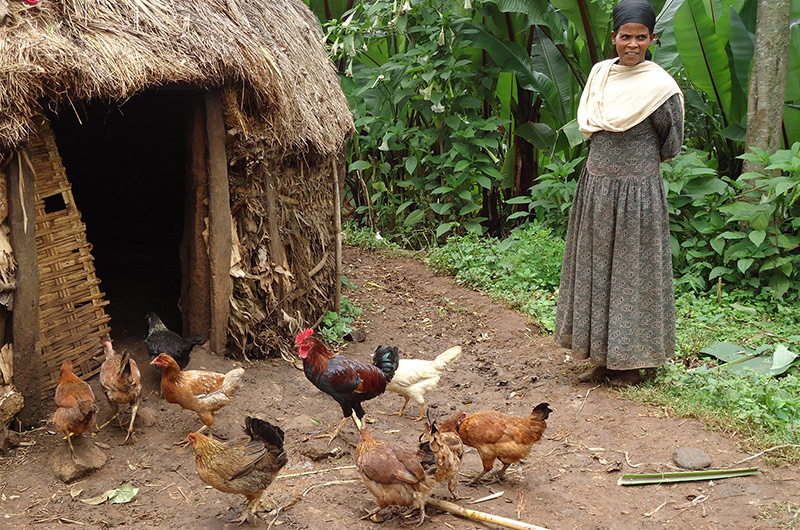New research by the RVC identifies markers for key health and productivity traits in sub-Saharan African chicken populations
A new study by the Royal Veterinary College (RVC), University of Liverpool, the University of Edinburgh’s Roslin Institute and partners of the Centre of Tropical Livestock Genetics and Health (CTLGH), has found that birds from two distinct indigenous chicken populations (ecotypes) in Ethiopia share several genetic regions linked to important productivity and disease resistance traits.
The first project of its kind to study genetic data from different African ecotypes collectively, the findings, which have been published in Frontiers in Genetics, will help support development of healthier, more resilient and more productive poultry in the future.
Led by Dr Androniki Psifidi, Lecturer in Veterinary Clinical Genetics at the RVC, researchers from Scotland’s Rural College (SRUC), the Roslin Institute, University of Liverpool, University of Nottingham, and the International Livestock Research Institute (ILRI), studied the DNA of over 700 indigenous African village chickens from two distinct ecotypes in Ethiopia; one from a high altitude, humid region, whilst the other was from a lowland arid part of the country.

Using genome-wide association studies and whole-genome sequencing data, researchers found that despite being from contrasting environments, researchers identified significant similarities in the genetic markers associated with production traits. These include putative candidate genes for resistance to Infectious Bursal Disease, Marek’s Disease and Fowl Typhoid, as well as Eimeria and cestode parasite infections.
The findings demonstrate that it is feasible to analyse combined genetic data from different chicken ecotypes, meaning researchers can work with bigger datasets to improve the effectiveness of genomic selection thereby improving the health and resilience of chickens, and efficiency of chicken production in the future.
Dr Androniki Psifidi, Lecturer in Veterinary Clinical Genetics at the RVC, said: “This work was the outcome of an interdisciplinary effort from scientists in multiple research institutes. Our study contributes to a better understanding of the dynamics and potential of indigenous African genetic resources for the benefit of poultry farming. We hope that the message conveyed by the present work will promote future collaborations across different regions.”
Professor Georgios Banos, Professor of Animal and Veterinary Sciences from SRUC, said: “We are very excited with these results and plan to continue our work on improving chicken productivity and farm sustainability. Chicken production has and will always have a multifaceted role in alleviating hunger and poverty, and enhancing social structures and quality of life in sub-Saharan Africa.”
Professor Olivier Hanotte, Principal Scientist at ILRI Addis Ababa, and Professor of Genetics and Conservation at the University of Nottingham, said: “This study is another illustration of how rapidly livestock have been able to successfully adapt to new environments. Over 3,000 years, the African village chicken has won the many challenges imposed by natural selection.”
This study was funded by the Biotechnology and Biological Sciences Research Council, the Foreign, Commonwealth and Development Office, the Scottish Government and CTLGH.
Notes to Editors
For more information please contact:
- Jasmin De Vivo (Jasmin.DeVivo@plmr.co.uk or rvc@plmr.co.uk
- Press Line: 0800 368 9520
About the RVC
- The Royal Veterinary College (RVC) is the UK's largest and longest established independent veterinary school and is a Member Institution of the University of London. It was the first in the world to hold full accreditation from AVMA, EAEVE, RCVS and AVBC.
- The RVC is the top veterinary school in the UK and Europe, and ranked as the world’s second highest veterinary school in the QS World University Rankings by subject, 2020.
- The RVC offers undergraduate and postgraduate programmes in veterinary medicine, veterinary nursing and biological sciences.
- In 2017, the RVC received a Gold award from the Teaching Excellence Framework (TEF) – the highest rating a university can receive.
- A research led institution with 79% of its research rated as internationally excellent or world class in the Research Excellence Framework 2014.
- The RVC provides animal owners and the veterinary profession with access to expert veterinary care and advice through its teaching hospitals and first opinion practices in London and Hertfordshire.

